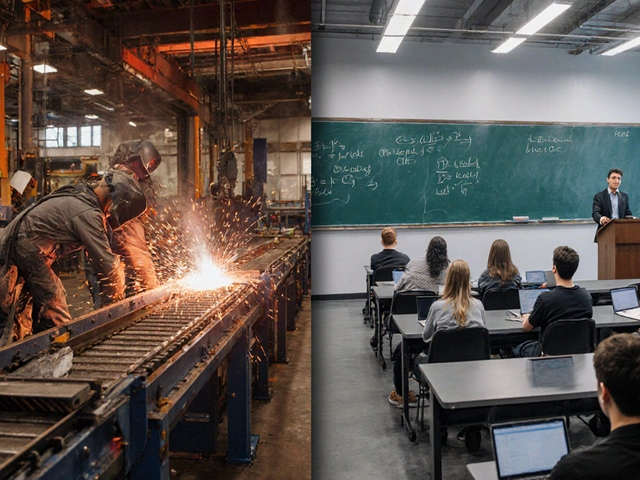Do you wonder what makes a degree cool in today's fast-paced world? It's not just about the subject itself, but also how it resonates with modern career trends and personal passions. Choosing a degree can feel overwhelming with so many exciting options out there.
From technology and innovation to creative fields, there's a new wave of education paths capturing the interest of students. Each choice opens up a unique world of opportunities and challenges. The journey of finding a cool degree can be as exciting as the job prospects it promises.
In this exploration, we'll look at some of the top degrees deemed cool by industry standards. We'll share insights on how these degrees align with emerging job markets and how they can be pivotal in shaping your future career. Whether you're a tech enthusiast or have a passion for the arts, there's something cool waiting for you in the realm of education.
- Understanding What Makes a Degree Cool
- Popular Cool Degrees in the Tech Industry
- Exploring Creative Degrees Beyond Conventional Choices
- Balancing Passion and Market Demand
- How to Prepare for Competitive Exams for Cool Degrees
- Long-Term Career Benefits of Choosing a Cool Degree
Understanding What Makes a Degree Cool
The concept of what truly makes a degree cool is constantly evolving alongside societal values and technological advancements. But at the heart of it all, a cool degree often aligns with current trends and anticipated future demands in the job market. Degrees like artificial intelligence or digital marketing appeal to many, not just because they're trendy, but because they are synonymous with innovation and creativity. They offer the skills required to navigate our rapidly changing world, meeting the needs of businesses and communities alike while presenting endless opportunities for those looking to stay ahead of the curve.
Employment factors heavily into the perception of a cool degree. The suggestion of a vibrant job market, with good pay and enviable work-life balances, transforms certain fields of study into magnetic options. This is exemplified by tech-related fields like computer science and data analytics which consistently rank high in demand due to ongoing digital transformation across industries. Job satisfaction and a sense of belonging among peers can also be indicators of a degree's cool factor. After all, entering a field where you can thrive both personally and professionally adds immense value to your educational journey.
Another layer to the equation is the alignment of personal interests with academic pursuits. Degrees in niche areas such as game design or environmental sustainability attract students who are passionate about specific interests. These fields allow individuals to merge hobbies with their professional life, creating a fulfilling career that's as rewarding as it is creative. If deep down you connect with the core subjects of a degree, it becomes cool by virtue of personal relevance. This dimension of coolness is quite subjective but no less significant.
"A cool degree is where passion meets market demand," explains Dr. Lisa Reynolds, a professor of career studies. "When students find that sweet spot, they not only enjoy their studies more but also gain a competitive edge in the job market."
Societal impact often plays a role in defining a degree's coolness factor. Degrees that focus on making a positive difference, like those in renewable energy or public health, appeal to students who wish to contribute to the greater good. These programs attract those who desire to combine careers with social impact, further supporting the idea that cool degrees are those offering a path to contribute significantly to society.
To truly understand what makes a degree cool, it's crucial to appreciate both objective criteria like employment potential and subjective elements such as personal passion and societal contribution. As students navigate their journeys through education, understanding these facets can aid in selecting a path that promises both professional success and personal fulfillment. The key lies in recognizing that coolness, ultimately, is less about conforming to trends and more about aligning with aspirations both individual and collective.
Popular Cool Degrees in the Tech Industry
As technology continues to evolve and shape our world, degrees in the tech industry have gained a reputation for being among the coolest around. One of the most sought-after educational paths is a degree in computer science, paving the way for a career in software development, database management, and even artificial intelligence. The allure of creating cutting-edge tech applications that enhance daily life draws many students to this field. With the exponential rise of the digital age, industries ranging from finance to healthcare rely heavily on tech expertise, offering diverse opportunities for computer science graduates.
Another exciting and swiftly growing field is data science. This degree stands out as a key player in the tech domain, thanks to its role in harnessing big data to drive decision-making processes in business, governance, and beyond. Data scientists are like modern-day alchemists, distilling vast amounts of data into actionable insights. The breadth of application for data science is staggering, supporting everything from personalized marketing campaigns to cutting-edge research in genetics. With the world's data doubling every two years, the demand for skilled data scientists is set to continue on an upward trajectory.
Degrees in cybersecurity have also emerged as highly valuable and cool. Given increasing concerns over hacking, cyber threats, and data protection, there's a booming need for cybersecurity experts. This degree not only promises job security but also involves a sense of mission: defending the integrity of information systems against potential breaches. As more daily activities switch to online modes—be it shopping, banking, or socializing—the importance of safe and secure digital operations cannot be understated. Individuals drawn to problem-solving and detective-like work will find a fulfilling career path here.
Then there's the intriguing field of robotics. As automation integrates into manufacturing, healthcare, and even home assistance, robotics engineers play a pivotal role in designing and improving these technologies. Students pursuing this degree find themselves at the forefront of innovation, combining knowledge from mechanical engineering, electronics, and computer science to build machines capable of complex tasks. An education in robotics equips graduates with the tools to participate in exciting projects, from self-driving cars to AI-driven healthcare solutions.
A cross-disciplinary degree that echoes coolness in the tech sphere is biotechnology. It merges aspects of biology and technology to address critical challenges, particularly in healthcare and environmental sustainability. A stimulating field for those interested in biology and tech innovation, biotech offers roles in genetic engineering, pharmaceuticals, and more. The industry is booming with breakthroughs in genome editing technologies such as CRISPR, which innovate in sectors like agriculture and medicine.
"Technology is best when it brings people together." — Matt Mullenweg
These cool tech degrees not only provide specialized knowledge but also foster skills such as problem-solving, creative thinking, and adaptability. The tech industry thrives on proactive, forward-thinking individuals ready to make their mark. While these degrees are highly specific, what truly makes them cool is the opportunity they provide to work on the cutting edge of innovation, contributing to advancements that shape the future. These tech paths offer a compelling blend of challenge, impact, and fulfillment for aspiring students.

Exploring Creative Degrees Beyond Conventional Choices
In a rapidly changing world, the concept of a 'cool' degree often extends beyond traditional academic boundaries, encompassing areas that foster creativity and innovation. Today, students are increasingly drawn towards fields that allow them to harness their unique talents and blend them with market demands. One such field that embodies this spirit is the realm of creative arts and design. This area offers a rich tapestry of options ranging from digital media to gaming design, allowing the creatively inclined to explore boundless opportunities without being tethered to conventional choices. The degrees associated with these fields not just echo the pulse of modern trends, they also prepare students for a future where visual storytelling and digital interaction play pivotal roles.
For instance, a degree in graphic design doesn't just teach art but also integrates technology to produce innovative solutions. This degree caters to various industries, offering flexibility and a chance to work on diverse projects. Similarly, an emerging degree like interactive media design invites students to engage audiences through digital experiences, a skill highly valued as brands focus on online presence. These programs are uniquely structured, often including elements of psychology, marketing, and programming, making graduates versatile in the job market.
Steve Jobs famously said, "Design is not just what it looks like and feels like. Design is how it works." This philosophy underlines the objective of creative degrees that transcend simple artistic expression to combine functionality with aesthetics.
Another remarkable choice in this realm is film production and cinematography. As the entertainment industry expands with streaming services and digital content, the demand for skilled storytellers and technical experts has soared. Students can immerse themselves in an ecosystem where they learn everything from scripting and editing to directing. In pursuing such a degree, students often contribute to creating content that mirrors society's narratives, offering a mirror to the human condition. This path not only encourages creativity but also facilitates powerful storytelling that resonates across global audiences.
The innovative education pathway of game design taps into the multi-billion dollar gaming industry, providing a space for those passionate about storytelling and technology. A blend of design, storytelling, and software engineering, this degree empowers students to create immersive entertainment experiences. With gaming fast becoming a dominant form of media, the demand for creative minds capable of addressing both the aesthetic and technical aspects is critical. Educational programs often integrate real-world projects, allowing students to graduate with a portfolio that showcases their potential to future employers.
| Degree | Average Annual Growth | Projected Job Openings |
|---|---|---|
| Graphic Design | 4% | 250,000 |
| Film Production | 5.5% | 150,000 |
| Game Design | 6% | 200,000 |
In the labyrinth of creative degrees, what makes one stand out as the coolest degree is often the perfect blend of personal passion with potential career benefits. These are not just courses but journeys that equip students with both the skillset and the mindset needed to succeed in a bustling, competitive landscape. So, for those willing to challenge the norm and think outside the box, creative degrees offer a valuable ticket to a fascinating world that rewards curiosity and imagination with endless opportunities.
Balancing Passion and Market Demand
Finding the perfect balance between following your passion and meeting market demand can sometimes feel like walking a tightrope. On one hand, doing what you love can lead to a lifetime of satisfaction and fulfillment. On the other, understanding the demands of the career path you choose is crucial to ensuring that you are not just happy, but also secure financially. Today, more than ever, students have the opportunity to select from various coolest degree options that cater to both their interests and the evolving job market.
Selecting a degree based on mere trendiness or personal interest without considering its future marketability can sometimes lead to unintended challenges. It's vital to gain insights into how your intended career field is projected to grow. The Bureau of Labor Statistics, for instance, offers comprehensive data that can help make informed decisions about degree selections. Keeping tabs on reports and predictions can provide a clearer picture of where your chosen field is heading.
It's common for young students to feel a clash between their dreams and parents' expectations. While someone might dream of becoming an artist, parents could prefer them becoming an engineer for stability reasons. Yet, the modern educational landscape allows students to integrate both. Double majors or carefully selected minors can ensure that students stay true to their dreams while also equipping themselves with skills that are always sought after.
As Steve Jobs once noted, "You've got to find what you love. And that is as true for your work as it is for your lovers." But he didn’t disregard the significance of market demands. It's not enough to be passionate; marrying that passion with actual need is what often leads to groundbreaking success. Learning to pivot when necessary and continuously evolving by building additional skills can create a robust career trajectory that stands the test of time.
Another practical approach to achieving balance is through internships or part-time roles while pursuing a competitive exam for a chosen degree. Actual industry exposure during your academic years can provide clarity on whether the degree complements your passion or if there's a need for course correction. Many companies are even offering fusion roles, blending creativity with technology, design with marketing, and much more.
Lastly, communicating with professionals already in your desired field can provide invaluable insights. They're living testaments to whether passion and market demand are really aligning in the industry. Industry mentors can provide guidance on certifications along with the education you're passionate about. This can ensure that your pursuit doesn’t just remain a personal dream but rather a fulfilling reality accepted by the wider market.

How to Prepare for Competitive Exams for Cool Degrees
Tackling competitive exams for cool degrees involves a strategic approach that blends dedication with smart study techniques. These exams often serve as gateways to some of the best academic programs around the world. Students are required to not only grasp the theoretical aspects of subjects but also demonstrate creative and critical thinking. Let's dive into some practical methods to enhance your preparation and increase your chances of success in these exams.
First, understanding the exam pattern and syllabus is crucial. Create a checklist of topics covered and prioritize them according to your strengths and weaknesses. Experimenting with various time management strategies can help you maximize productivity. Allocating fixed hours for different subjects ensures that none are left behind, which can boost confidence across the board. Immersing yourself in mock tests regularly under timed conditions is a proven strategy. It helps simulate the real exam environment and evaluate your performance levels. Finally, engaging with past year papers broadens your perspective on the range of questions asked.
Studying for such exams is not just about rote memorization; rather, it's about embracing a deep understanding of concepts. Incorporating multiple resources such as textbooks, online tutorials, and discussion forums can enrich your knowledge base. Joining study groups is another way to exchange ideas and gain insights from peers. Additionally, setting specific milestones rewards small victories and keeps enthusiasm alive. Celebrate achieving daily goals—it adds excitement to the prep time.
Effective note-making techniques can simplify reviewing vast syllabi. Adopt methods like mind mapping and flashcards to retain information quickly. They act as visual aids that significantly enhance memory retention. Rely on summarizing each topic in your own words, which facilitates better comprehension not only for exam success but also for real-world applications. Practicing problem-solving by working on different scenarios is beneficial, as it enhances the ability to apply learned concepts to varied situations.
"Success in competitive examinations requires a blend of hard work, mental agility, and analytical thinking—all supported by a clear understanding of your goals." - Amit Goel, noted education expert.
Health and wellness play vital roles in effective preparation. Adequate sleep, balanced nutrition, and regular exercise empower the mind and body to perform at optimum levels. They minimize stress and boost concentration. Establish a routine that incorporates relaxation techniques like meditation or yoga, as these greatly contribute to maintaining focus over extended study periods. Lastly, stay motivated by visualizing your objectives and reminding yourself why pursuing a cool degree is important to you.
Long-Term Career Benefits of Choosing a Cool Degree
Diving into a coolest degree offers more than just personal satisfaction; it can set the stage for a thriving career with enduring benefits. Students often debate which paths provide not just an engaging college experience but also secure futures. Cool degrees often feature specialized knowledge that aligns well with the rapid changes in today’s job market. Whether it involves technological advancements or fresh approaches to traditional industries, these degrees often tie in with industry needs, ensuring skills remain relevant and in demand. Entry into these fields comes with a heightened scope for innovation, encouraging graduates to not only follow trends but to set them.
Pursuing a degree that stands out in its coolness often leads to enhanced job prospects. Employers value the unique skills and fresh perspectives that these courses generate, making graduates particularly appealing in competitive environments. Often, companies look beyond the traditional experience and seek out those who can think creatively and approach problems from angles not considered before. The confidence and adaptability gained through such courses offer a significant advantage in workplaces eager for growth through new ideas. By investing in a cool degree, you equip yourself with a toolkit that adapts to changes, securing not just jobs but an evolving career.
Competitive exams for these fields often ensure that entrants are not just academically capable but have a genuine interest and aptitude in the subject matter. This aligns with employers’ pursuit of talent who are in it for the long haul. When these factors converge, they not only amplify your professional standing but also often lead to higher salaries and growth opportunities. Moreover, having a degree that resonates with market dynamics makes navigating the job landscape less daunting. As the job market becomes increasingly global, holding a cool degree can also enhance your credentials internationally, catering to a diverse array of opportunities worldwide.
Aligning personal interests with academic pursuits through a degree that stands out cultivates a fulfilling career path. The foundation built during these years doesn’t just prepare you for a job but molds you into a professional ready to tackle challenges that come your way. A well-selected degree means benefiting from strong networking opportunities, as those courses often feature collaborative projects that reflect real-world scenarios. This hands-on experience ensures a smoother transition into professional roles, making you ready from day one. Well-networked alumni and institutions bring further career advantages, offering not just advice but opening doors to possibilities that you might not conventionally anticipate.
Modern careers demand not just a single set of skills but a multidisciplinary approach that cool degrees inherently provide. Recognized for encouraging lateral thinking and problem-solving, these degrees help you excel in environments where innovation is the key to sustainability. As you grow in your career, the return on investment becomes evident, and those who chose paths that interest them often report higher career satisfaction. It's not just about job prospects straight out of college but maintaining enthusiasm and motivation throughout one’s professional life. With challenges around every corner, a cool degree proves invaluable, ensuring that no matter where the job market navigates, you're equipped to steer your course effectively.









0 Comments